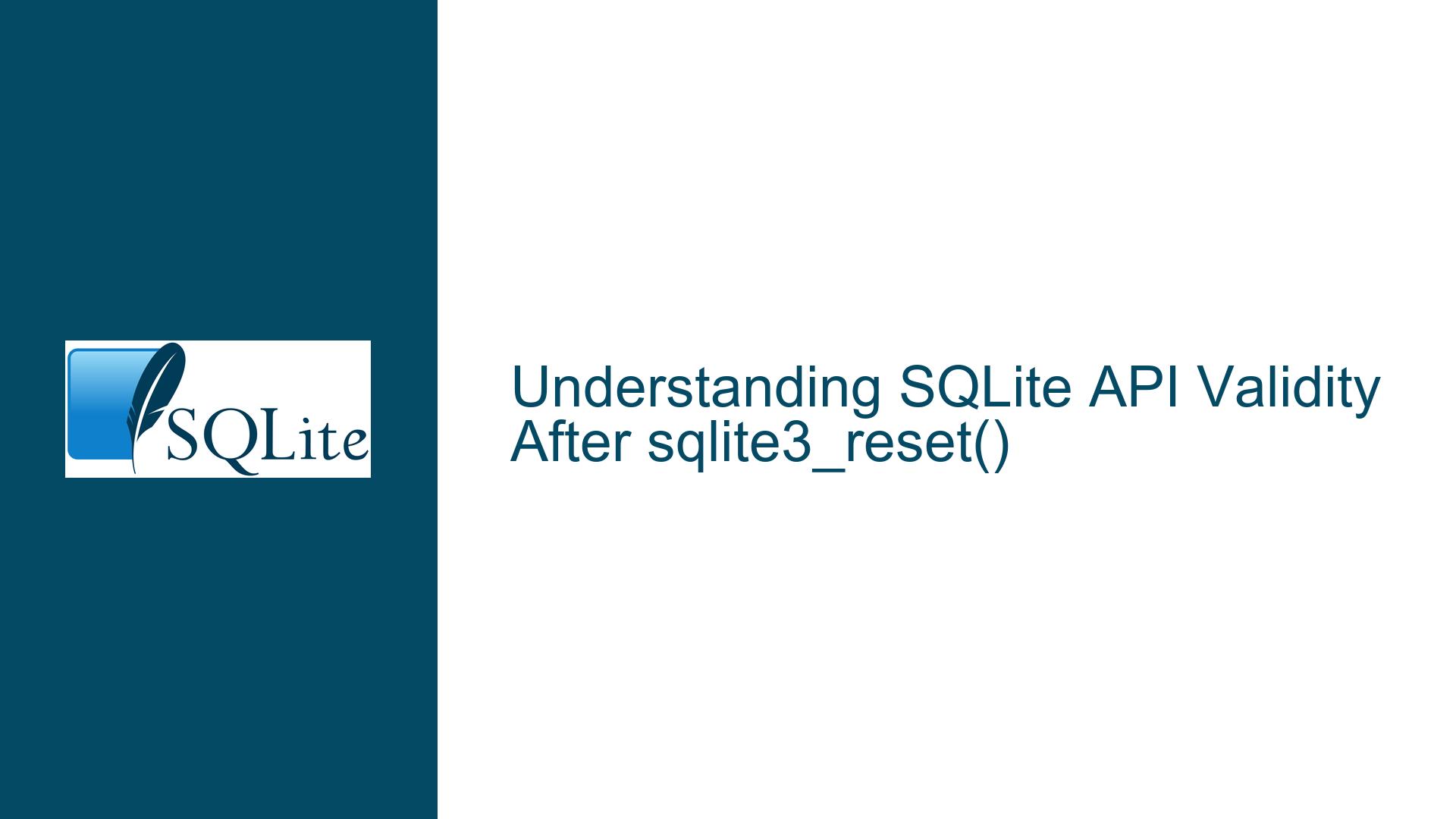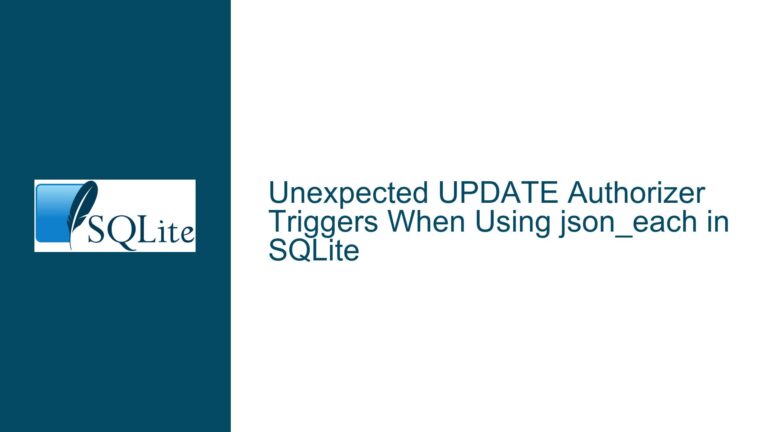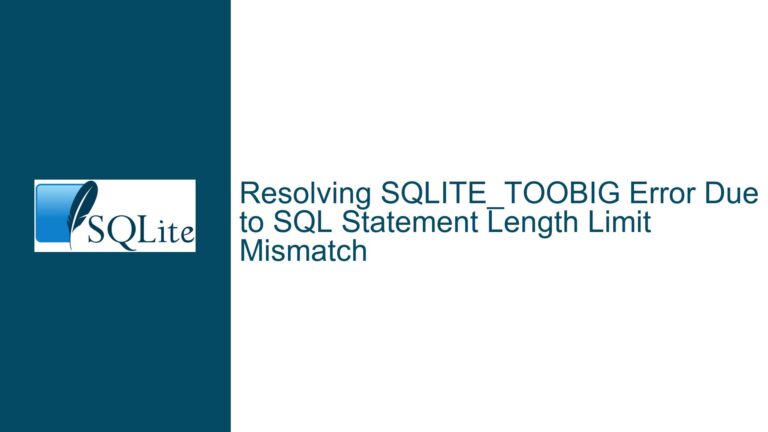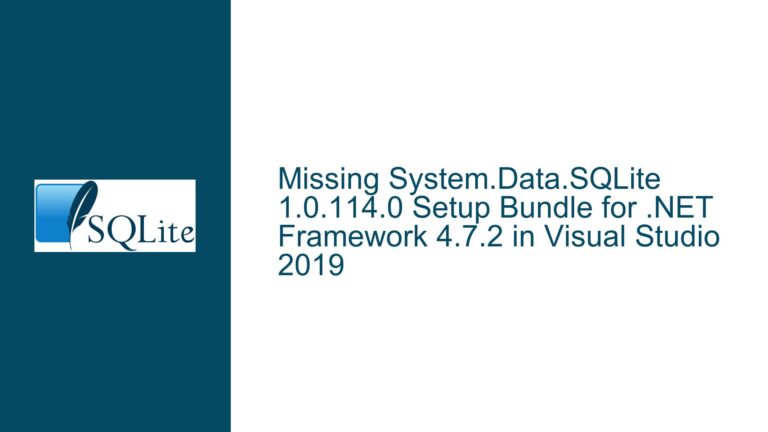SQLite API Validity After sqlite3_reset()
SQLite Statement Lifecycle and Metadata Access
Issue Overview
The core concern revolves around whether SQLite3 C/C++ API functions—specifically metadata-access routines like sqlite3_column_name(), sqlite3_column_table_name(), sqlite3_sql(), and sqlite3_expanded_sql()—remain valid and safe to use after calling sqlite3_reset() on a prepared statement. This question arises in scenarios where a statement execution cycle (e.g., sqlite3_step() → SQLITE_DONE) is followed by a reset, after which metadata or SQL text retrieval functions are invoked. Misunderstanding the validity of these APIs can lead to undefined behavior, memory leaks, or crashes if developers assume invariants about statement state that do not hold.
SQLite’s API design differentiates between metadata functions (which depend only on the prepared state of a statement) and result data functions (which require the statement to be in an active execution state). For example:
sqlite3_column_name()andsqlite3_column_table_name()access column metadata, which is fixed once the statement is prepared.sqlite3_sql()andsqlite3_expanded_sql()retrieve the SQL text associated with the statement, which persists until the statement is finalized.sqlite3_column_int(),sqlite3_column_text(), and similar functions access result data, which is only valid aftersqlite3_step()returnsSQLITE_ROWand before the statement is reset or finalized.
The confusion stems from conflating the lifecycle phases of a prepared statement: preparation, execution, reset, and finalization. After sqlite3_reset(), the statement transitions back to a "prepared but not executed" state. While this invalidates result data accessors, it does not affect metadata or SQL text retrieval functions. Developers must rigorously distinguish between these categories to avoid accessing invalid memory or misinterpreting API contracts.
Key Factors Influencing API Validity
Possible Causes
The primary causes of uncertainty around API validity post-reset include:
Misinterpretation of SQLite’s Statement State Transitions
SQLite prepared statements progress through states:- Prepared: The statement is compiled but not executed.
- Active:
sqlite3_step()has returnedSQLITE_ROWorSQLITE_DONE, allowing result data access. - Reset: The statement is returned to the "prepared" state via
sqlite3_reset(), discarding runtime data but retaining compiled metadata. - Finalized: The statement is destroyed via
sqlite3_finalize(), invalidating all associated resources.
After reset, the statement reverts to the "prepared" state. APIs that require an "active" state (e.g.,
sqlite3_column_blob()) become invalid, while those tied to the "prepared" state (e.g.,sqlite3_column_name()) remain valid.Overlooking Memory Ownership Semantics
Functions likesqlite3_expanded_sql()return heap-allocated strings that require manual deallocation viasqlite3_free(), whereassqlite3_sql()returns a pointer managed by SQLite. Callingsqlite3_reset()does not affect these pointers, but failing to freesqlite3_expanded_sql()results in memory leaks.Assumption of Uniform Validity Across APIs
Developers may erroneously assume that allsqlite3_column_*functions behave identically. For instance,sqlite3_column_count()remains valid post-reset because it depends on the prepared statement’s structure, whereassqlite3_column_type()becomes invalid as it reflects the current row’s data.Inadequate Documentation Scrutiny
SQLite’s documentation explicitly states prerequisites for each API. For example,sqlite3_column_name()is valid "at any point in the lifecycle of a prepared statement," whilesqlite3_column_value()requires the statement to be in an "active" state. Misuse often arises from incomplete review of these specifications.
Resolving Ambiguity and Ensuring Correct Usage
Troubleshooting Steps, Solutions & Fixes
1. Categorize APIs by State Dependency
To avoid misuse, classify SQLite APIs based on their state requirements:
Metadata and Structure APIs (Always Valid Post-Preparation):
sqlite3_column_name()sqlite3_column_table_name()sqlite3_column_count()sqlite3_sql()sqlite3_normalized_sql()
These functions rely on the statement’s compiled structure, which persists until finalization. They can be called after
sqlite3_reset()or even before the firstsqlite3_step().Result Data APIs (Valid Only During Active State):
sqlite3_column_int(),sqlite3_column_double(), etc.sqlite3_column_bytes()sqlite3_column_type()
These functions require the statement to be in an active state (i.e., after
sqlite3_step()returnsSQLITE_ROW). Calling them aftersqlite3_reset()leads to undefined behavior.Dynamic SQL Text APIs (Valid Until Finalization, With Caveats):
sqlite3_expanded_sql(): Returns achar*that must be freed withsqlite3_free().sqlite3_sql(): Returns aconst char*managed by SQLite.
Both remain valid post-reset, but
sqlite3_expanded_sql()incurs a heap allocation burden.
2. Validate Code Flow Against State Transitions
Audit code to ensure that result data accessors are only called when the statement is active:
sqlite3_stmt *stmt;
// Prepare statement
while (sqlite3_step(stmt) == SQLITE_ROW) {
// Access result data: valid
int value = sqlite3_column_int(stmt, 0);
}
// After SQLITE_DONE, reset the statement
sqlite3_reset(stmt);
// Access metadata: valid
const char *col_name = sqlite3_column_name(stmt, 0);
// Access result data: INVALID
int invalid_value = sqlite3_column_int(stmt, 0);
In this example, accessing sqlite3_column_int() after reset is invalid and should be flagged during code review.
3. Enforce Memory Management for Expanded SQL
When using sqlite3_expanded_sql(), pair it with sqlite3_free() to prevent leaks:
char *expanded_sql = sqlite3_expanded_sql(stmt);
// Use expanded_sql...
sqlite3_free(expanded_sql); // Mandatory
Unlike sqlite3_sql(), which returns a static string, sqlite3_expanded_sql() allocates memory that the developer must release.
4. Leverage Debugging Aids
SQLite’s debugging features can detect API misuse:
- SQLITE_DEBUG: Compile SQLite with
-DSQLITE_DEBUGto enable internal consistency checks. - SQLITE_ENABLE_API_ARMOR: Define this macro to force parameter validation, crashing on invalid API usage instead of permitting undefined behavior.
These tools help catch post-reset access to invalid APIs during development.
5. Adopt Defensive Programming Patterns
Structure code to isolate metadata access from result data processing:
void process_statement(sqlite3_stmt *stmt) {
// Retrieve metadata once, after preparation
int col_count = sqlite3_column_count(stmt);
for (int i = 0; i < col_count; i++) {
printf("Column %d: %s\n", i, sqlite3_column_name(stmt, i));
}
// Execute and process data
while (sqlite3_step(stmt) == SQLITE_ROW) {
// Access result data
}
// Reset and reuse the statement
sqlite3_reset(stmt);
}
By accessing metadata immediately after preparation, developers avoid relying on post-reset validity, even though it is technically permissible.
6. Consult Documentation for Edge Cases
Certain APIs have nuanced validity rules:
sqlite3_column_database_name(): Valid post-preparation, like other metadata functions.sqlite3_stmt_readonly(): Valid any time after preparation.sqlite3_stmt_busy(): Returns true if the statement is in an active state (mid-execution).
Cross-referencing the official SQLite C API documentation ensures compliance with these rules.
7. Unit Test State Transitions
Develop test cases that exercise APIs before and after reset:
TEST_F(SQLiteTest, PostResetValidity) {
sqlite3_stmt *stmt;
sqlite3_prepare_v2(db, "SELECT * FROM empty_table", -1, &stmt, NULL);
// Step to completion
ASSERT_EQ(sqlite3_step(stmt), SQLITE_DONE);
// Reset
ASSERT_EQ(sqlite3_reset(stmt), SQLITE_OK);
// Verify metadata access
EXPECT_STRNE(sqlite3_column_name(stmt, 0), NULL);
// Verify result data access is invalid
// Note: SQLite may return 0 or garbage; behavior is undefined
EXPECT_EQ(sqlite3_column_type(stmt, 0), SQLITE_NULL);
sqlite3_finalize(stmt);
}
Such tests validate assumptions about API behavior across state transitions.
8. Refactor Code to Separate Concerns
Restructure codebases to clearly demarcate phases:
- Preparation Phase: Retrieve metadata, column names, and SQL text.
- Execution Phase: Access result data within
SQLITE_ROWloops. - Reset/Reuse Phase: Reset the statement and repeat execution without re-preparing.
This separation reduces the risk of accessing invalid APIs.
9. Monitor Community Best Practices
Engage with SQLite’s mailing lists, forums, and GitHub repositories to stay informed about API usage patterns. For example, the SQLite forum frequently addresses lifecycle questions, offering real-world insights into edge cases.
10. Utilize Static Analysis Tools
Tools like Clang’s scan-build or commercial static analyzers can detect API misuse patterns, such as calling sqlite3_column_text() after a reset. Integrate these tools into CI/CD pipelines to enforce correctness.
By systematically applying these strategies, developers can eliminate ambiguity around SQLite API validity, ensuring robust and maintainable database interactions.






